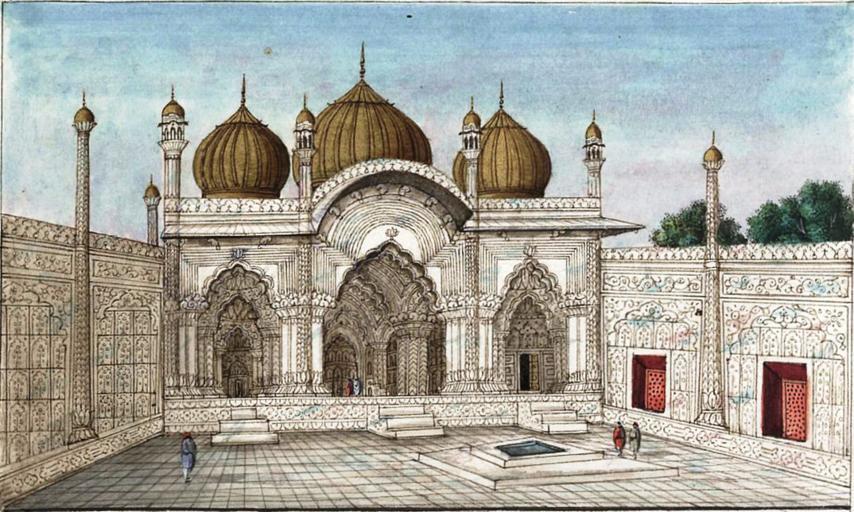MAKE A MEME
View Large Image

| View Original: | Reminiscences_of_Imperial_Delhi_Moti_Masjid_within_the_Palace.png (1074x644) | |||
| Download: | Original | Medium | Small | Thumb |
| Courtesy of: | commons.wikimedia.org | More Like This | ||
| Keywords: Reminiscences of Imperial Delhi Moti Masjid within the Palace.png en The Soneiree Musjid or Golden Mosque so denominated from its gilt domes is situated within the city and nearly opposite the Palace It was constructed in AD 1747 by the Nawab Buhadur Khan a nobleman of the Reign of the Emperor Ahmud Shah and is built of the Bassee Jung or a light salmon coloured stone not usually applied to this purpose which gives the building a singular and picturesque appearance The natives of India though willing to erect expensive edifices in order to perpetuate their own names are not equally liberal in repairing the public works of their predecessors The Nawab Ahmud Bukhsh Khan father of the wretched Nawab of Ferozepoor was an exception to this rule for he repaired the Mosque in question with a view to the benefit of the neighborhood Soon after when passing by with his second and favorite son he was attacked by an infuriated elephant who killed one of the horses and dashed the vehicle to pieces The Nawab and his son were only saved from destruction by the proximity of this mosque in which they were able to take refuge This incident has added not a little to the interest of the building Known in history also by the name of Javeid who supplanted the Newab Sufdur Jung see page 24 f 28 the Minister in the good opinion of the Emperor Ahmud Shah In revenge the Newab invited Javeid to an entertainment and caused him to be murdered during the banquet The Motee Musjid or Pearl Mosque within the precincts of the Royal Palace is entirely of marble It was constructed by the Emperor Aurungzeb Aulumgeer literally the ornament of the throne and conqueror of the worlds who reigned between the years AD 1658 and 1707 Its origin is attributed to a fit of compunction for the cruelties exercised by him towards his two elder brothers Dara Skekoh and Moorad It is a very beautiful mosque but from being enclosed in the front and both sides by high walls is not seen to advantage The Sonehri Masjid or Golden Mosque of Nawab Bahadur ˜Ali Khan was built in 1747 at the order of Qudsia Begum It is opposite the Delhi Gate of the red fort Inscribed naqsha-i masjid-i navab Bahadur ˜Ali Khan bara qil ˜a The Moti Masjid within the palace of the Red fort The small mosque was built in 1659 by Aurangzeb r 1658-1707 for the Emperor's private prayers The outer face of the mosque is of solid red sandstone and internally it is in white marble Inscribed naqsha-i moti masjid andarun-i shahjahanabad From 'Reminiscences of Imperial Delhi ™ an album consisting of 89 folios containing approximately 130 paintings of views of the Mughal and pre-Mughal monuments of Delhi as well as other contemporary material with an accompanying manuscript text written by Sir Thomas Theophilus Metcalfe 1795-1853 the Governor-General ™s Agent at the imperial court Acquired with the assistance of the Heritage Lottery Fund and of the National Art-Collections Fund 1843 http //www bl uk/onlinegallery/onlineex/apac/addorimss/s/019addor0005475u00042vrb html Metcalfe Sir Thomas Theophilus 1795-1853 PD-Art-100 Reminiscences of Imperial Delhi Moti Masjid Red Fort Red Fort in art | ||||